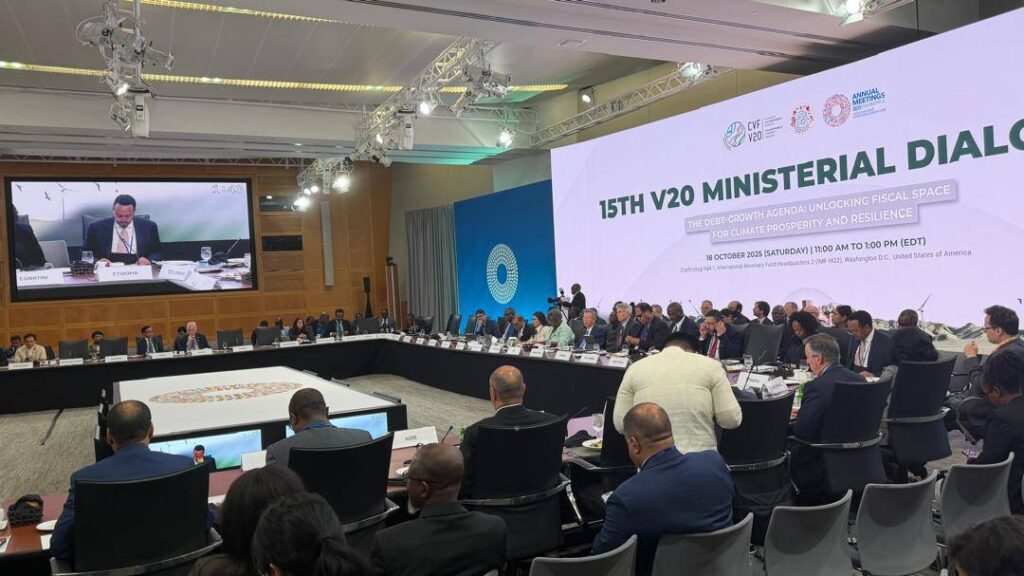Ethiopia Calls for Inclusive Global Financial Support for Climate Vulnerable Nations
Addis Ababa, October 19, 2025 — Finance Minister Ahmed Shide of Ethiopia has emphasized a pressing need for a more inclusive and responsive global financial system to better support developing nations and those particularly susceptible to climate change. His remarks were delivered during the V20 Ministerial Dialogue at the International Monetary Fund (IMF) Headquarters in Washington, D.C.
Urgent Challenges for Climate Vulnerable Countries
Minister Ahmed articulated the urgent challenges facing climate-vulnerable nations like Ethiopia, which are increasingly subjected to extreme climate events such as droughts and floods. These climatic shifts substantially strain public finances, a situation exacerbated by rising debt servicing obligations that threaten hard-won development gains and resilience-building efforts.
Ethiopia’s Leadership in Sustainable Development
Ethiopia has positioned itself as a pioneer in Africa for pursuing a low-carbon, climate-resilient development pathway, as noted by Minister Ahmed. He highlighted several flagship initiatives aimed at enhancing sustainability and environmental stewardship.
Green Legacy Program
One of these initiatives is the Green Legacy Program, which focuses on restoring and protecting forests. This program aims to harness economic benefits and enhance carbon sequestration, fostering broad public participation and receiving strong support from Prime Minister Abiy Ahmed.
Renewable Energy and Innovation
Minister Ahmed shared that Ethiopia’s energy mix is currently composed of 95% renewable sources. The government is pivoting towards electric mobility as part of its overarching green transition agenda. This shift is integral to improving environmental sustainability while decreasing reliance on fossil fuels.
Calls for Improved Global Financial Architecture
During his address, Minister Ahmed called for:
-
Greater Access to Concessional Financing: He stressed the importance of increasing access to favorable funding options and climate-specific grants, which are essential for countries to invest in adaptation and resilience without exacerbating their debt burdens.
-
Innovative Financial Instruments: The use of novel solutions like debt-for-climate swaps was emphasized as a way to create fiscal space while advancing social and environmental goals.
The V20 Ministerial Dialogue serves as a vital platform for reforming global financial norms, amplifying the collective voice of nations vulnerable to climate change.
Strengthening Health Infrastructure through Partnerships
Minister Ahmed also engaged in a productive meeting with Dr. Sania Nishtar, the Chief Executive Officer of Gavi, the Vaccine Alliance. Their discussions centered around strengthening Ethiopia’s health infrastructure and immunization programs, vital components in building a resilient society.
Commitment to Immunization Strategy
He expressed gratitude for Gavi’s ongoing support, highlighting immunization as a central pillar of Ethiopia’s health strategy. The Minister noted notable successes in recent vaccination campaigns against measles and polio, as well as the “Big Catch-Up” initiative, which has managed to reach nearly one million previously unvaccinated children.
Recognition of Public Health Leadership
Dr. Nishtar recognized Ethiopia’s leadership in advancing public health across Africa, commending its contributions to the Africa CDC and congratulating Ethiopia on achieving WHO Maturity Level 3 in health system performance. She reaffirmed Gavi’s commitment to enhancing collaboration with Ethiopia.
Conclusion
As climate-related challenges escalate, the call for a more comprehensive and inclusive global financial architecture is more critical than ever. Countries like Ethiopia are leading the way in sustainable practices and health initiatives, but they require stronger support from the international community to truly thrive and innovate in the face of climate adversity.
For more on Ethiopia’s initiatives and global climate financing, visit the World Bank and IMF websites.
